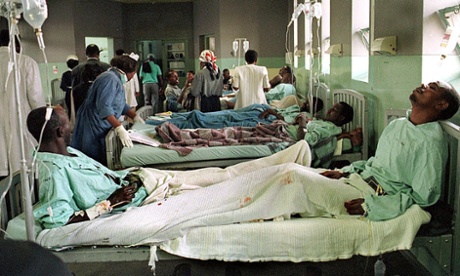
At least 50 people have died in Kenya from drinking illegal liquor believed to have been laced with industrial alcohol to boost its strength.
Dozens more people were hospitalised and several went blind, authorities and media reports said. Television footage showed victims writhing in pain in hospitals in the eastern and central counties of Embu, Kitui and Kiambu.
In Kiambu county, where 11 people died, police said authorities were looking out for more victims. Embu police said at least 24 people died while 77 were in hospital.
Kenya’s KTN television reported a total of 50 deaths, while Citizen TV report 61 deaths.
The spirits probably all originated from one batch, said John Mututho, chairman of a state-run campaign against alcohol and drug abuse.
Drinking dens selling illicit home brews from jerry cans are common in the back streets of many Kenyan towns and villages. They prompted Mututho, a former lawmaker, to sponsor a landmark alcohol control law in 2010 but it has proved ineffective.
“One of the ladies who is now blind said they started drinking at 5am,” Mututho told Citizen. “There is no outlet in Kenya which is authorised to open at 5am. In fact the earliest it should be (is) 5pm.”
The deaths were first reported on Sunday night, Kimaiyo said. Consumption of homemade liquor in Kenya is high; more than half the population lives below the poverty line and many cannot afford to buy retail alcohol. Occasionally deaths occur from consuming illicit brew when traders lace it with methanol.
In June 2005 45 people were killed from illegal alcohol containing methanol. Five years earlier about 130 people died from a toxic batch in Nairobi.
Reuters and the Associated Press contributed to this report

Leave a Reply